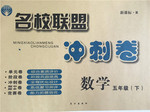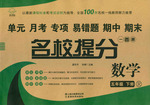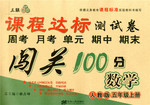
 名校联盟冲刺卷系列答案
名校联盟冲刺卷系列答案 名校提分一卷通系列答案
名校提分一卷通系列答案 课程达标测试卷闯关100分系列答案
课程达标测试卷闯关100分系列答案科目:高中英语 来源: 题型:阅读理解
One day, Wilson was walking quietly along the road when someone hit him hard on the back of his neck. He looked behind him, and saw a young man whom he had never seen before.
“How dare you hit me like that?” shouted Wilson.
The young man said he had mistaken Wilson for a friend of his and that he thought Wilson was making a lot of noise about nothing.
This insult(侮辱) made Wilson even angrier, of course, and he at once decided to bring the young man before a judge.
Now , the judge who heard the case was a friend of the young man’s father’s, and, although he pretended to be quite fair, he was thinking about what he could do to protect the young man from being punished while at the same time not to be appearing unfair.
Finally he said to Wilson, “I understand your feelings in this matter very well. Would you be satisfied if I let you hit the young man as he hit you?”
Wilson said he would not be. The young man had insulted him and should be properly punished.
“Well, then,” said the judge to the young man, “I order you to pay ten coins to Wilson.”
Ten coins was very little for such a crime, but the young man did not have it with him, so the judge allowed him to go and get it.
Wilson waited for him to return with the money. He waited an hour, and then two hours, while the judge took care of other business.
When it was nearly time for the court to close, Wilson chose a moment when the judge was especially busy, came up quietly and hit him hard on the back of the neck. Then he said to him, “I am sorry, but I can’t wait any longer. When the young man comes back, tell him that I have passed my right to the ten coins on to you.”
Why did the young man hit Wilson from behind?
A. Wilson had hit him before. B. He had mistaken Wilson for a friend of his.
C. Wilson was a stranger there. D. Wilson made a lot of noise when he was walking.
The judge thought about how to protect the young man because .
A. he thought it a small matter B. as a judge, he should be fair
C. he thought the man too young to be punished D. the young man was his friend’s son
According to the passage, while of the following is TRUE?
A. The young man was ordered to hit himself as hard as he had done on Wilson.
B. Wilson was allowed to hit the young man as hard as he had done.
C. Wilson was allowed to do more insulting on the young man.
D. The young man was ordered to hand a lot of money to Wilson.
The judge allowed the young man to go home, hoping .
A. he would not return any more B. he could escape from there
C. he would return in two hours D. he would get the money
The best title for this passage is .
A. I’ve passed my right on to you B. The judge and Wilson
C. Wilson and the young man D. The young man was set free
查看答案和解析>>
科目:高中英语 来源: 题型:阅读理解
In October 1961 at Crowley Field in Cincinnati Ohio an old deaf gentleman named William E. Hoy stood up to throw the first ball of the World Series. Most people at Crowley Field on that day probably did not remember Hoy because he had retired(退休) from professional baseball 58 years earlier in 1903. However he had been an outstanding player and the deaf people still talk about him and his years in baseball.
William E. Hoy was born in Houckstown Ohio on May 23, 1862. He became deaf when he was two years old. He attended the Columbus Ohio School for the deaf. After graduation he started playing baseball while working as a shoemaker.
Hoy began playing professional baseball in 1886 for Oshkosh(Wisconsin) of the Northwestern League. In 1888 he started as an outfielder(外场手) with the old Washington Senators. His small figure and speed made him an outstanding base runner. He was very good at stealing bases during his career. In the 1888 major league season he stole 82 bases. He was also the Senators' leading hitter in 1888. Hoy was clever and he threw right-handed and batted left-handed. On June 19,1889 he threw out three batters(击球手) at the plate from his outfield position.
The arm signals used by judges today to show balls and strikes began because of Hoy. The judge lifted his right arm to show that the pitch was a strike and his left arm to signal that it was a ball.
For many years people talked about Hoy's last ball game in 1903. He was playing for Los Angeles of the Pacific Coast Winter League. It was a memorable game because Hoy hit a wonderful ball which won the game. It was a very foggy day and therefore very hard to see the ball. In the ninth inning(棒球的一局) with two men out, Hoy managed to catch a fly ball to make the third out in spite of the fog. Los Angeles defeated their opposition and won the game.
After he retired Hoy stayed busy. He ran a dairy farm near Cincinnati for 20 years. He also became a public speaker and travelled giving speeches. Until a few years before his death he took 4-10 mile walks several mornings a week. On December 15, 1961 William Hoy died at the age of 99.
6. In which order did the following things happen in Hoy's life?
a. Hoy worked as a shoemaker.
b. Hoy began to run a diary farm.
c. Hoy played a memorable game in the heavy fog.
d. Hoy threw the first ball of the World Series.
e. Hoy became deaf.
A. d, e, a, c, b B. e, a, c, b, d
C. d, a, e, c, b D. e, a, b, c, d
7. We can infer from the last paragraph that Hoy ________ in his late years.
A. became famous
B. led a relaxed life
C. travelled around the world
D. was in good physical condition
8. This passage is mainly about ________.
A. a deaf player devoted to the game of baseball
B. baseball game rules and important players
C. the rise in the social position of the deaf people
D. where the baseball judge hand signals came from
9. What can be inferred from this passage?
A. Hoy was the greatest baseball player in his time.
B. Speaking and listening are not necessary in baseball games.
C. The judge had to study the hand signals very seriously.
D. Hoy's family encouraged him to become a baseball player.
查看答案和解析>>
科目:高中英语 来源:2011届江苏省南京市白下区高三二模模拟考试英语卷 题型:阅读理解
The small unframed painting called “Fisherman” was signed by a little-known Italian artist, Maveleone (1669-1740). When it was sold recently in New York for $27,000, the seller, Mr. Oliver Pitt, was asked to explain how the picture had come into his possession.
Pitt said, “I didn’t know it was so valuable. I’m not an art expert. Photography is my hobby. I bought ‘Fisherman’ in Italy in 1970 for $140. The picture was dirty, and I couldn’t see the artist’s signature. But anyway it wasn’t the picture that I liked. I bought it because of the frame. ”
“It’s a most unusual frame, made of tiny, silvery sea-shells. They are set in such a way that they reflect perfect light onto the surface of a picture. I now have a photograph of my wife in that frame, and I’ll never part with it.”
“When I returned to New York I showed the painting in its frame to a customs officer. I told him that I had paid $140 for it but admitted I didn’t know its actual worth. The customs man valued it at $140, and I was asked to pay duty on that value. I did so, there and then. ”
“Later, I took off the frame, and that uncovered Maveleone’s signature. My wife suggested in fun that the painting might be a valuable one, so I cleaned it and put it up for sale.”
As a result of this explanation, Oliver Pitt had to appear in court. He was accused of knowingly making a false statement of the value of a picture so as to cheat the Customs Department.
Pitt was not happy. “I told the truth as I knew it then,” he said, “What else could I say?”
And then the judge agreed with him. “The Customs Department is to be responsible,” he said, “for making a true valuation of goods brought into the country, so that the correct amount of duty may be charged. Mr. Pitt did not cause or try to cause the mistake that was made. He paid the duty that was demanded. If, now, the Customs Department finds that its valuation was not correct, it cannot be allowed to have another try. Pitt is not guilty”.
【小题1】When Oliver Pitt bought the picture, ________.
| A.it was unframed | B.Maveleone signed the deal |
| C.he suggested that it was valuable | D.it was the frame that attracted him |
| A.the painting would have cost much more than $ 140 |
| B.he wouldn’t have sold his painting |
| C.the customs officer wouldn’t have been cheated |
| D.Pitt wouldn’t have had the intention to buy any of his paintings |
| A.clean the painting to put it up for sale |
| B.look for the artist’s signature |
| C.use it for his wife’s photograph |
| D.find the painting’s true value |
| A.In the end Pitt was asked to pay the correct amount of duty. |
| B.In the end Pitt sold the frame of the painting at an even higher price. |
| C.In the end the Customs Department had no right to revalue the painting. |
| D.In the end Pitt’s wife was regarded as an expert because of her wise suggestion. |
查看答案和解析>>
科目:高中英语 来源:09-10学年度福建省龙岩市高一上学期期末考试 题型:阅读理解
第三部分 阅读理解(共15小题;每小题2分,满分30分)
阅读下列段文,从每题所给的四个选项(A、B、C和D)中,选出最佳选项。
A poor traveller stopped under the tree to eat the boiled rice and vegetables which he had brought with him. A few metres away, there was a small shop by the side of the road where a woman was frying (油炸)fish and selling it to travelers. The woman watched the poor traveler carefully, and when he finished his food and began to go, she shouted rudely, “You haven’t paid me for the fried fish!”
“But I have not had any fried fish!” he said.
“But everyone can see that you enjoyed the smell of my fried fish with your rice and vegetables,” said the woman, “If you had not smelled the fish, your meal would not have been so pleasant!”
Soon a crowd collected, and although they supported the poor traveler, they had to admit that wind was blowing from the shop to the place where he had eaten, and that it had carried the smell of the fried fish to him.
Finally, the woman took the poor traveler to a judge, who said, “The woman says that the traveler ate his meal with the smell of her fried fish. The traveler agrees that the wind was blowing from the woman’s shop to the place where he ate his rice and vegetables, and that it carried the smell of her fried fish to his nose while he was eating, so he must pay for it. What does your fried fish cost?” he asked the woman.
“Twenty-five cents a plate,” she answered, delighted.
“Then go outside together,” said the judge. “There the traveler must hold up a twenty-five-cent piece so that its shadow(影子)falls on the woman’s hand. The price of the smell of a plate of fried fish is the shadow of twenty-five cents.”
51. The traveler refused to pay the woman for the fried fish because .
A. he was poor B. he was rude
C. he was supported by a crowd D. he hadn’t eaten her fried fish at all
52. Which of the following statements is true according to the passage?
A. The traveler bought the boiled rice and vegetables and ate them by the side of the road.
B. The judge had no idea what the woman meant.
C. In the fifth paragraph, the first “it” has the same meaning as the second “it”.
D. The woman got nothing but the shadow of twenty-five cents in the end.
53. The best title for the passage should be .
A. The Smell and the Shadow
B. A Poor Traveler
C. A Rude Woman
D. A Woman and a Traveler
查看答案和解析>>
科目:高中英语 来源:浙江省舟山市东海中学2009-2010学年高二下学期四校联考期末考试试题(英语) 题型:阅读理解
It's no secret that many children would be healthier and happier with adoptive parents than with the parents that nature dealt them. That's especially true of children who remain in abusive homes because the law blindly favors biological parents. It's also true of children who suffer for years in foster homes (收养孩子的家庭) because of parents who can't or won't care for them but refuse to give up custody (监护) rights.
Fourteen-year-old Kimberly Mays fits neither description, but her recent court victory could eventually help children who do. Kimberly has been the object of an angry custody baffle between the man who raised her and her biological parents, with whom she has never lived. A Florida judge ruled that the teenager can remain with the only father she's ever known and that her biological parents have "no legal claim" on her.
The ruling, though it may yet be reversed, sets aside the principle that biology is the primary determinant of parentage. That's an important development, one that's long overdue.
Shortly after birth in December 1978, Kimberly Mays and another infant were mistakenly switched and sent home with the wrong parents. Kimberly's biological parents, Ernest and Regina Twigg, received a child who died of a heart disease in 1988. Medical tests showed that the child wasn't the Twiggs' own daughter, but Kimt only was, thus sparking a custody battle with Robert Mays. In 1989, the two families agreed that Mr. Mays would maintain custody with the Twiggs getting visiting fights. Those rights were ended when Mr. Mays decided that Kimberly was being harmed.
The decision to leave Kimberly with Mr. Mays rendered her suit debated. But the judge made clear that Kimberly did have standing to sue ( 起诉) on her own behalf. Thus he made clear that she was more than just property to be handled as adults saw fit.
Certainly, the biological link between parent and child is fundamental. But biological parents aren't always preferable to adoptive ones, and biological parentage does not convey an absolute ownership that cancels all the rights of children.
36. What was the primary consideration in the Florida judge's ruling?
A. The biological link. B. The child's benefits.
C. The traditional practice. D. The parents' feelings.
37. We can learn from the Kimberly case that
A. children are more than just personal possessions of their parents
B. the biological link between parent and child should be emphasized
C. foster homes bring children more pain and suffering than care
D. biological parents shouldn't claim custody rights after their child is adopted
38. The Twiggs claimed custody rights to Kimberly because
A. they found her unhappy in Mr. Mays' custody B. they regarded her as their property
C. they were her biological parents D. they felt guilty about their past mistake
39. Kimberly had been given to Mr. Mays
A. by sheer accident B. at his request C. out of charity D. for better care
40. The author's attitude towards the judge's ruling could be described as
A. doubtful B. cautious C. critical D. supportive
查看答案和解析>>
湖北省互联网违法和不良信息举报平台 | 网上有害信息举报专区 | 电信诈骗举报专区 | 涉历史虚无主义有害信息举报专区 | 涉企侵权举报专区
违法和不良信息举报电话:027-86699610 举报邮箱:58377363@163.com